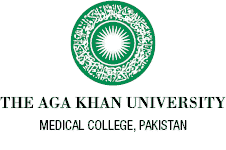Experimental Medicine Platform - Maternal Probiotic Intervention to Improve Gut Health
Principal Investigator: Dr Fyezah Jehan
Team members: Dr. M. Imran Nisar, Dr. Waqasuddin Khan, Dr. Najeeha Iqbal, Dr. Mehreen Arshad, Dr Naveed Iqbal, Ms. Javairia Khalid, Ms. Aneeta Hotwani, Mr. Furqan Kabir
Funding agency & funding: Bill and Melinda Gates Foundation USD $2,061,778
Introduction:
Experimental Medicine Platforms (EMPs) are learning structures that seek to understand the impact of different microbial-directed interventions on systemic and intestinal biomarkers of Environmental Enteric Dysfunction (EED) in pregnant mothers in low- and middle income countries.
EED is a complex gastrointestinal disorder characterized by altered gut permeability, immune cell infiltration, and changes in intestinal architecture. This condition is increasingly recognized as a significant contributor to childhood stunting, particularly in resource-limited settings, by impairing nutrient absorption and gut function.
EED results from a confluence of factors, including persistent gut infections, nutritional deficiencies, and immune dysregulation. This leads to an imbalance in the gut microbiota—the community of 100 trillion bacteria residing in the gastrointestinal tract. Disrupted microbiota not only compromises the intestinal barrier function but also triggers systemic inflammation through microbial translocation.
Emerging evidence suggests that EED can originate even in utero, linking maternal health directly to the condition. Studies in regions like rural Bangladesh have shown a high prevalence of EED among undernourished pregnant women, which in turn affects fetal growth and development, perpetuating the cycle of malnutrition and stunting.
The potential therapeutic role of probiotics in managing EED is an area of growing interest. Probiotics might aid in restoring gut microbial balance, enhancing mucosal barrier function, and improving nutrient absorption. Our research aims to explore how a specific probiotic strains can modulate gut microbiota, reduce intestinal inflammation markers, and thereby improve gut health. This approach could offer a novel intervention strategy to mitigate the global burden of EED, with implications for both maternal and child health.
Characterization of the human microbiome can provide valuable insights into the status of human health and disposition to disease. We are using genetic sequencing to understand the gut microbiome and its influence on maternal and child health. The gut microbiome changes during pregnancy and appears to differ in women with certain pregnancy-associated complications. An infant’s microbiome may have long-term implications for its physical growth, nutritional status, and cognitive development.
Whole genome shotgun metagenomics sequencing technology offers a robust way to study the effect of the gut microbiome on human health. Shotgun metagenomics is the untargeted (“shotgun”) sequencing of all microbial genomes present in a sample. To understand the transmission and adaptation of the maternal and infant gut microbiomes and how they could be modulated to manage risk factors in pregnancy, We are performing such sequencing on maternal fecal samples taken pre- and post-probiotic intervention to confer alter microbiomes.
Project aims:
The study is part of a large effort by AKU to become a leader in gut microbiome research in Pakistan and to undertake clinical studies of interventions that can improve maternal, fetal and infant health. It is being funded by the Bill & Melinda Gates Foundation as part of the development of a multi-country platform that will enable subsequent clinical trials of interventions for improving maternal nutritional status and fetal growth. Other study sites are located in Bangladesh, Senegal and Zambia.
For this initiative, AKU has been selected as the central lab to coordinate and perform lab assays and sample analysis across all participating sites. Briefly, this involves managing the logistics of sample shipment, ensuring that samples are handled and transported under the required conditions and within the stipulated timelines to maintain their integrity. Team members are also dedicating significant efforts towards the development and maintenance of the lab/bioinformatics and capacity and infrastructure needed to perform these activities.
EMPs are funded as a localized approach to accelerated design and testing of maternal microbiome-directed interventions, by designing iterative, small in-human studies that will enable safety and efficacy testing of microbiome-candidate interventions in geographically relevant contexts. Implementation of Phase I studies began in 2022, with the infrastructure now in place, and trial I is currently underway.
Position openings:
Research Associates
Research Specialists
Get in touch:
waqasuddin.khan@aku.edu
javairia.khalid@aku.edu
fyezah.jehan@aku.edu


